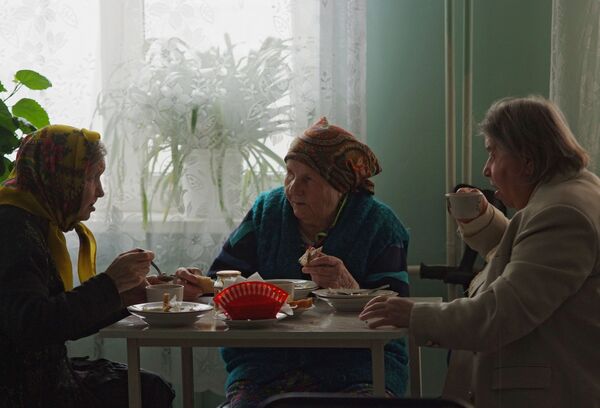Valentina Chebotareva, a retired history professor at the prestigious Moscow State University, is one of the government's most important voters at the forthcoming elections. She is also one of their biggest problems.
"These are difficult times for pensioners in Russia," Chebotareva says, sipping at a cup of strong black tea. "Prices are rising and the state pension [an average $300 a month] barely covers food and utility bills, let alone warm clothing for the winter."
Chebotareva is not the only one complaining: Russia's ageing population is putting a heavy strain on the state's pension fund and retirees are beginning to feel the bite of a 1.3 trillion ruble ($45.7 billion) pension fund budget deficit.
Currently the number of pensioners in Russia is around a third of the number of workers, a figure similar to many European countries. But at 60 for men and just 55 for women, Russia's retirement age remains relatively low.
At the current rate of population decline, the ratio will rise to around 50/50 by 2030 and Standard and Poor's credit ratings agency forecasts that age-related expenditures will rise to 25.5 percent of GDP by 2050 from 13 percent in 2010.
Yet the government insists it has no plans to raise the retirement age.
"By our estimates, it would be absolutely wrong to even raise this issue before 2030," Deputy Health Minister Yuri Voronin told the state-run Russia 24 TV channel on Tuesday. "We need to prepare the system before we can solve this problem."
And who can blame them? With parliamentary elections fast approaching and presidential elections due next year, the last thing Russia's ruling elite wants to do is anger the biggest chunk of its electorate. Life expectancy levels are still hovering at around 62 years for men and 74 for women, so a rise in the retirement age by just two years would mean that the average male dies before receiving his first pension payment.
But analysts say it is only a matter of time.
"I think the retirement age will be raised by no more than two years in the next two to three years," says Anton Nikitin, an economics analyst at Moscow-based investment bank Renaissance Capital. "The move will be difficult to implement politically as pensioners make up a third of the voting population, so it is unlikely to change in the pre-election year."
In neighboring Ukraine, where the retirement age is the same as in Russia, talk about taking the leap is already causing grumbles. Under the conditions of a $15 billion loan from the International Monetary Fund, the ex-Soviet state must raise the retirement age for women to 60 within the next 10 years.
Under pressure from the fund, which is withholding the loan's latest $1.6 billion tranche until the pension reform is adopted, President Viktor Yanukovich announced last week that the retirement age for both women and men would be gradually raised.
Proposed tax reforms sparked demonstrations in Kiev in December, and the hike in the retirement age is unlikely to avoid a similar response. In France, more than 3 million people joined country-wide protests late last year against the increase of the pension age there from 60 to 62.
Having once been part of the same country, Russia's demographics differ little from Ukraine's. But with the oil price hovering around $100 a barrel, Russia can afford to postpone the inevitable rise in the retirement age, at least while oil revenues last.
In her spacious Moscow apartment, Chebotareva says that when it does eventually come, the rise in the retirement age in Russia is unlikely to cause much of a stir.
"All pensioners supplement their pensions by working anyway; I'm an academic, so I survive by writing books," she says, pointing to an extensive shelf on the wall-to-ceiling bookcase that stretches the length of her living room.
"Others aren't so lucky, but they usually find work looking after children, or selling food on the street," she adds.
The views expressed in this article are the author's and do not necessarily represent those of RIA Novosti.
MOSCOW, March 4 (RIA Novosti, Natasha Doff)

